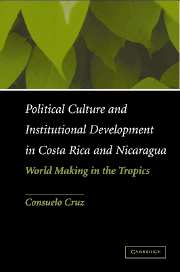 Political Culture and Institutional Development in Costa Rica and Nicaragua
Political Culture and Institutional Development in Costa Rica and Nicaragua Book contents
- Frontmatter
- Contents
- Acknowledgments
- List of Abbreviations
- Chronology
- Political Culture and Institutional Development in Costa Rica and Nicaragua
- Introduction
- 1 Theoretical Overview
- 2 Manichean Identities and Normative Scheming: Origins
- 3 Orphans of Empire: Constructing National Identities
- 4 Postcolonial Paths: Rhetorical Strategies and Frames
- 5 Costa Rica: Possibility Mongers
- 6 Nicaragua: Hybrid Arbitration
- 7 Tropical Histories: Paradise and Hell on Earth
- 8 Transition: Familiar Novelties
- Conclusion
- Index
5 - Costa Rica: Possibility Mongers
Published online by Cambridge University Press: 20 August 2009
- Frontmatter
- Contents
- Acknowledgments
- List of Abbreviations
- Chronology
- Political Culture and Institutional Development in Costa Rica and Nicaragua
- Introduction
- 1 Theoretical Overview
- 2 Manichean Identities and Normative Scheming: Origins
- 3 Orphans of Empire: Constructing National Identities
- 4 Postcolonial Paths: Rhetorical Strategies and Frames
- 5 Costa Rica: Possibility Mongers
- 6 Nicaragua: Hybrid Arbitration
- 7 Tropical Histories: Paradise and Hell on Earth
- 8 Transition: Familiar Novelties
- Conclusion
- Index
Summary
To articulate the past historically does not mean to recognize it “the way it really was.” … It means to seize hold of a memory as it flashes up at a moment of danger.
–Walter BenjaminCosta Rica's political elites confronted two defining moments of danger after they emerged into the light of day from the turbulent postcolonial period. One came at mid-nineteenth century, the other in the middle of the twentieth. In both instances, the elites perceived the threat as distinctly foreign. In both instances, as Benjamin would have it, they turned to the task of articulating history by seizing on their memorable past. The broad outcome, at both points, was a restored system of Manichean normative scheming in which the foe was, in contradistinction to the Nicaraguan system, foreign to the nation. But if at both points in Costa Rica the most tangible result was a reformist state characterized by a developmental bent, it was only at the latter point that the electoral principle of political democracy was finally sacralized. This chapter argues that the rhetorical politics of the 1948 Revolution show that this was possible because the existing political culture engendered its own rupture. Specifically, a group of political actors, though insignificant in numbers, managed to craft a compelling reason for themselves and others to bring down the government. This compelling reason they crafted out of traditional identity-based fears and convictions on the one hand, and new threats emerging in a changing world on the other.
- Type
- Chapter
- Information
- Political Culture and Institutional Development in Costa Rica and NicaraguaWorld Making in the Tropics, pp. 112 - 145Publisher: Cambridge University PressPrint publication year: 2005


